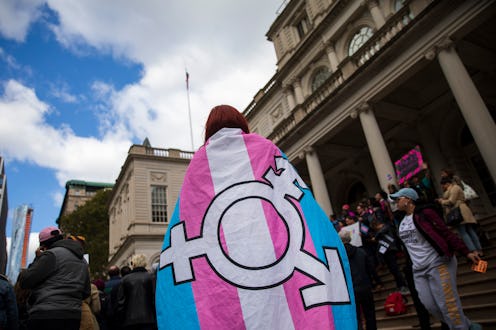News
Here’s What You Can Do To Fight Trump’s Attempt To Quash Trans Health Care Protections

In what amounts to the third anti-trans endeavor rolled out in a week, the Trump administration has announced plans to rollback Obama-era protections for transgender patients. A proposed rule change by the Department of Health and Human Services (HHS) on Friday said in effect that "gender identity" is not among the protections guaranteed under federal law barring sex discrimination in health care. Advocates fear the change would effectively sanction discrimination against transgender patients. But the proposed rule isn't official law just yet; there are ways to protest the Trump administration's rollback of transgender protections in an effort to keep it from being finalized.
In 2016, the Obama administration officially defined discrimination on "the basis of sex" to include gender identity in an effort to prohibit providers and insurers from discriminating against transgender, non-binary, gender-fluid, or other LGBTQ patients. But in rolling out the proposed rule change, the Trump administration is moving to reverse the decision to extend discrimination protections outlined in the Affordable Care Act to transgender patients.
Before it can be finalized, however, the HHS proposal must undergo a 60-day public comment period. You can submit comments to this proposed rule — identified by the Department of Health and Human Services as RIN 0945- AA11 by mail, courier, hand delivery, or soon, on the agency's e-portal here.
As the Transgender Law Center and the National Center for Transgender Equality point out in their campaign to Protect Trans Health, a large number of public comments can force the government to look more closely at the issues at play behind a proposed rule change. They argue that public comments are the best way to show widespread public opposition as they can, in large enough numbers, slow the regulation's proposed change or force the draft rule to be modified or, in some cases, dropped altogether.
Those looking for help in what to say when leaving an effective public comment, can garner guidance from the Transgender Law Center and the National Center for Transgender Equality's Protect Trans Health campaign. The organization can also help in getting your comment submitted to the Department of Health and Human Services.
In its docket, the Department of Health and Human Services argued the change was a necessary response to lawsuits challenging the Obama administration's interpretation of sex. What's more, they claimed the proposed rule would promote "consistent expectations and enforcement."
Opponents of the change, however, have argued that it could give doctors, hospitals, health care workers, and insurance companies the legal ability to refuse vital care and health services to LGBTQ people. "By repealing a regulation clarifying that LGBT people are protected against health care discrimination under the Affordable Care Act's nondiscrimination provisions, the Trump Administration seeks to deny life-saving health care to LGBT people and others and replaces these critical protections with a narrow definition of sex, not grounded in science or the law," Lambda Legal Litigation Director Diana Flynn said in a statement released by the organization.
Executive Director for the National Center for Transgender Equality Mara Keisling argued the new rule was based on "prejudice" and would "abandon 2 million Americans who already face significant barriers to accessing adequate and life-saving health care."
"This is not about free health care or special treatment. It's about the right of every American to be treated with dignity when they walk into an emergency room, meet a new doctor, or find the right insurance plan," Keisling said in a statement. "If permitted, this rule will promote ignorance and hate that no American should have to face while seeking care, and we are ready to fight it with everything we've got."
Friday's proposed rule follows the finalization of a regulation enabling health care workers to refuse to treat transgender patients on grounds of religious objection and the drafting of a second rule which would permit homeless shelters to deny transgender people aid.